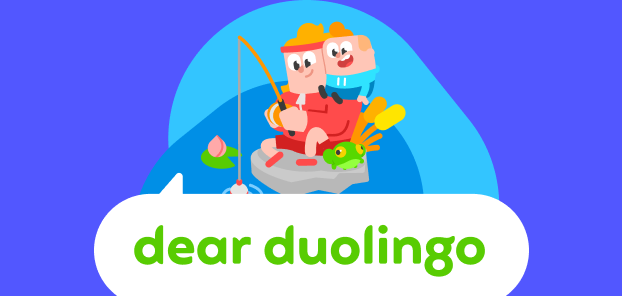Welcome to another week of Dear Duolingo, an advice column just for learners. Catch up on past installments here.

Hey there, learners! We're back this week with an interesting question about what makes some languages easier—or harder—to learn. Here it is:
This week's question:
Dear Duolingo,
If a person is part Cuban, is it easier to learn Spanish?
Thank you,
Familiar Territory
This question is definitely worth answering—and not just because I am also part Cuban and also grew up very much wanting to learn Spanish. 😉 In fact, it's a question we get from readers of many ethnic and linguistic backgrounds!
The short answer is no… but as usual, there is a more complex, unexpected answer, too.
Our brains are (mostly) blank slates
The basic answer to Familiar Territory's question is no:
That's because when we're born, our little baby brains are mostly blank slates. You might have heard this before, but what does it mean?
In the case of language, it means that our brains are built for learning language, but *which* language is totally up to our environment. If a baby hears a lot of Korean, they'll start learning Korean, and if they hear a lot of Norwegian, they'll start learning Norwegian, etc. Of course, quite a lot can happen after a baby is born—they could hear multiple languages, move from one language environment to another, reach adulthood and learn a second language, or even forget the first language they knew.
So if our genetics doesn't program our brains to learn a specific language… why do I keep saying we're only mostly a blank slate? 🤔
That's because we actually do some language learning before we are born 🤯 Not as a result of our DNA, but because some sounds make it from the outside world to the baby during pregnancy! This starts happening late in the third trimester, and it includes more "general" kinds of sounds, like different rhythms and voices, but not details like vowels, consonants, or specific words. Since languages can have really different rhythms, newborn babies can tell apart languages with *their* rhythm (the rhythm they heard during the end of the pregnancy) versus languages with a really different rhythm. (Researchers do these studies with babies only a few hours or days old!)
So if you heard a language just before you were born or when you were a baby, your brain did learn some of it—which can make it easier to relearn—but it's not because of genetics.
How our family language can impact learning
So while our brains are born ready to learn any language, things change as soon as we're out here in the world 😅 Here are some of the ways our family's language can have an impact on how well we learn it later—even if we didn't hear it as a baby or growing up.
Motivation
Learning a language to a high level of proficiency takes a long time—no matter the person and no matter the language. Since you'll need to stick with it, motivation is super important, and studying a language you're personally invested in can really help you stay motivated. If you're learning a language to communicate with relatives or because it connects you to your family history, your sense of purpose can help you power through the (inevitable) challenges.
Implicit (accidental!) learning
If you're learning a family language that's used by your relatives or in your community, you might know more of the language than you realize. We do a lot of language learning implicitly, without even trying or studying it deliberately, so if the family language you want to learn is one you've been around, you might already know some vocabulary and phrases (like greetings or common sayings). Your brain might have also learned a lot about the sounds of the language, even if you don't consciously remember the language itself!
This situation is really common for some kinds of bilinguals, including heritage bilinguals like "No Sabo" kids and receptive bilinguals, who understand (some of) their family language but aren't comfortable speaking it. In some bilingual communities, codeswitching (mixing of two or more languages) is common, so even if you aren't bilingual (yet!), you might have picked up on some of the language from overhearing it mixed in with the language you know.
Practice opportunities
Another possible advantage to studying your family language is more opportunities to practice it. Depending on the language and your community, it can be difficult to find conversation partners. If you have family members who speak the language you're learning, they might be really excited to help you practice! Understanding natural, conversational language can be really challenging, so be patient with yourself (and your unwitting cousin/aunt/grandparent).
A familiar story
There are many reasons to study a language, and family and culture are popular choices! Your learning journey will have many stages and take many forms, so finding a personal reason to stick with it is a great way to achieve your language goals.
For more answers to your language and learning questions, get in touch with us by emailing dearduolingo@duolingo.com.
